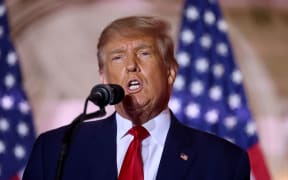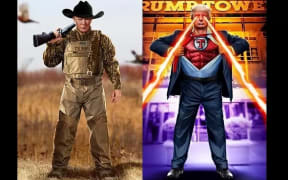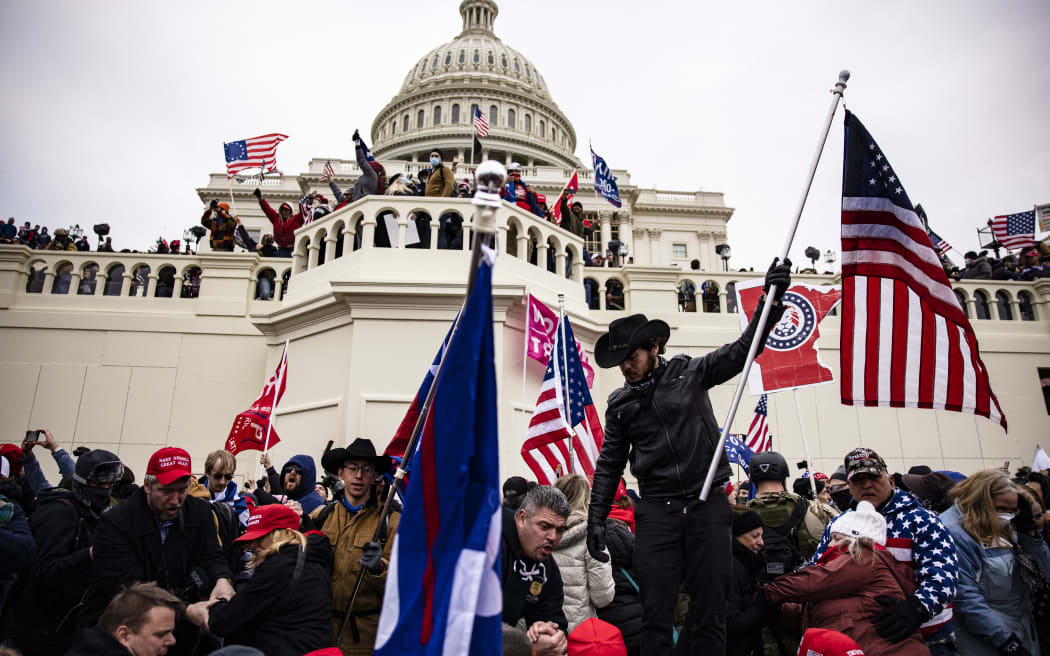
Five people died during or shortly after the 6 January riot and invasion of the US Capitol buildings, in Washington DC. Photo: AFP/ Getty -Samuel Corum
By Kayla Epstein & Mike Wendling, of BBC News
The congressional panel investigating last year's attack on the US Capitol has accused former President Donald Trump of a "multi-part conspiracy" to overturn his election defeat three months earlier.
The panel released its final 845-page report on the attack today.
It placed the blame for the 6 January 2021 storming of Congress squarely on the former president.
It also recommended barring Trump from public office in the future.
He did not co-operate with the panel and declared the final report a "witch hunt" after its release.
Over 18 months, the committee held 10 public hearings and interviewed more than 1000 witnesses, including Trump administration officials and staff, Trump family members, Capitol police officers, rioters, militia members, and more.
On Monday, the panel of seven Democrats and two Republicans recommended the justice department investigate Trump - who is mounting another White House campaign - for aiding an insurrection and three other federal crimes.
The Democratic chairman of the select committee, Bennie Thompson of Mississippi, wrote in a foreword to the eight-chapter report that it was once "unimaginable" the president of the United States would incite a mob to march on the Capitol.
Here are the committee's key findings, which were released on Thursday night:
1) Trump continued to make false claims about the election, even though aides told him they were untrue
The committee said that Trump's decision to falsely declare victory on election night 2020 was "premeditated", and that only his lawyer, Rudy Giuliani, supported this action. The former president soon began making unfounded claims of wide scale voter fraud, and continued to do so with more frequency after the election was called for Joe Biden.
The committee pointed to their interviews with several advisers and lawyers close to Trump, who said they did not believe these claims of fraud or could find no evidence of the phenomenon.
Most notable among those voices was former Attorney General William Barr, who told the committee during a deposition: "I made it clear that I did not agree with the idea of saying the election was stolen and putting out this stuff, which I told the president was [expletive.]"
The president continued to sow election conspiracies over the coming weeks, though top Trump administration officials testified they informed him the claims were not true.
2) Trump's rhetoric brought rioters to DC
The committee made the argument that the attack on the Capitol was sparked by Trump himself.
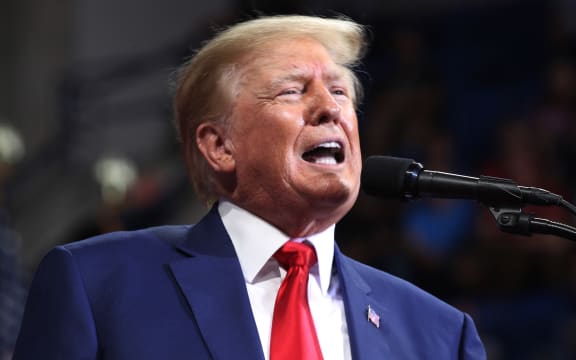
Former US president Donald Trump Photo: AFP / Getty Images
In addition to Trump's repeated fraud claims, the committee pointed to a 19 December 2020 tweet, in which the then-president wrote: "Big protest in DC on January 6th. Be there, will be wild!"
In depositions and court documents, rioters and militia members who were present at the Capitol that day cited Trump's tweet as their rationale for coming to Washington. The committee cited men like Robert Morss, who was found guilty of assaulting officers during the Capitol breach. Morss "believed January 6th stood for the moment when '1776 Will Commence Again' because President Trump asked them to 'Be there, Will be Wild'", the report stated.
The committee also cited Secret Service warnings that people were planning to come to Washington on 6 January and threatening to "be wild".
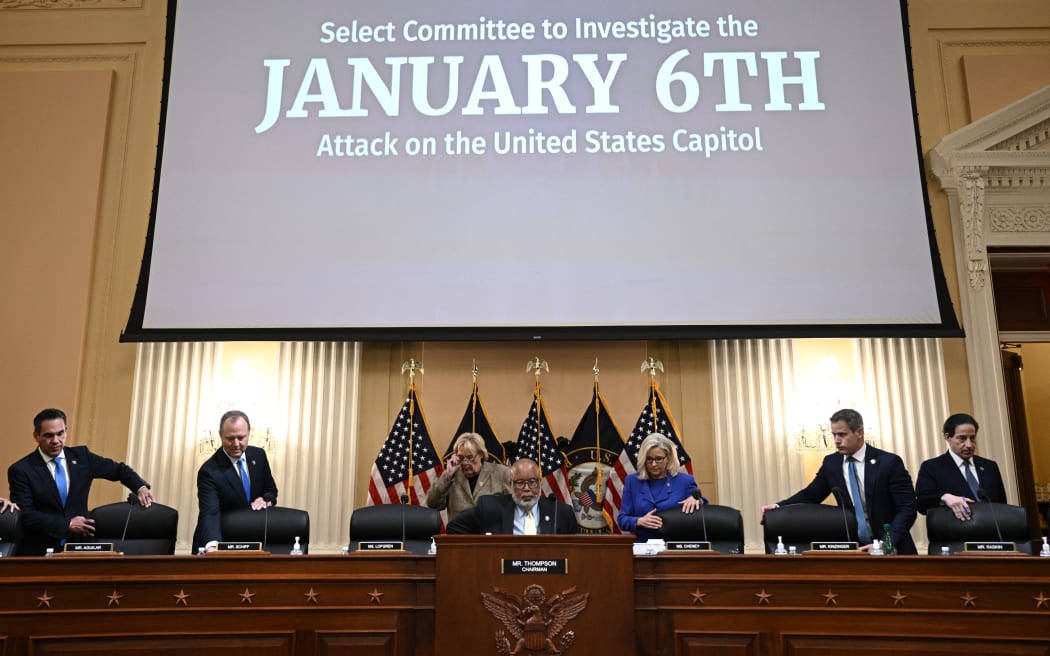
The US Congressional Committee charged with investigating the events of 6 January released its report today. Photo:
3) Trump failed to act during the riot
The committee argued that Trump did not take action as the 6 January attack commenced, and that he ignored warnings coming from Congress that a serious attack was unfolding.
Some of their conclusion rests on the testimony of former White House staffer Cassidy Hutchinson, who appeared in a blockbuster hearing earlier this year and also gave depositions about the chaos she said she witnessed in the White House that day.
According to a transcript of her testimony released on Thursday, a former White House ethics lawyer had attempted to coach Hutchinson before she gave evidence to the committee: "The less you remember, the better."
The committee also cited communications between lawmakers trapped in the Capitol and White House chief of staff Mark Meadows, who was receiving an increasingly desperate barrage of pleas from members of Congress who were forced into hiding.
Texts from Hope Hicks, one of Trump's most loyal aides, summed up the dismay among staff at the White House.
Hicks texted Ivanka Trump's chief of staff, Julie Radford, after the riot saying "we all look like domestic terrorists now".
She also texted a White House lawyer: "I'm so upset. Everything we worked for wiped away."
4) Far-right groups planned - then acted
Tips about armed groups targeting Washington and even the Capitol specifically started coming in December 2020. The report noted that the FBI was sent messages circulating on groups run by the far-right Oath Keepers and Proud Boys.
"There is only one way. It is not signs. It's not rallies. It's [expletive] bullets," said one.
Capitol Police and Secret Service agents - who are responsible for protecting the president - received similar messages from insiders and others. Some specifically named the Capitol as a focus for potentially violent activity.
Some of the chatter came from private encrypted chat apps, but other messages were publicly visible on pro-Trump websites and Twitter.
Members of the far-right groups ended up among the crowds inside the Capitol on 6 January.
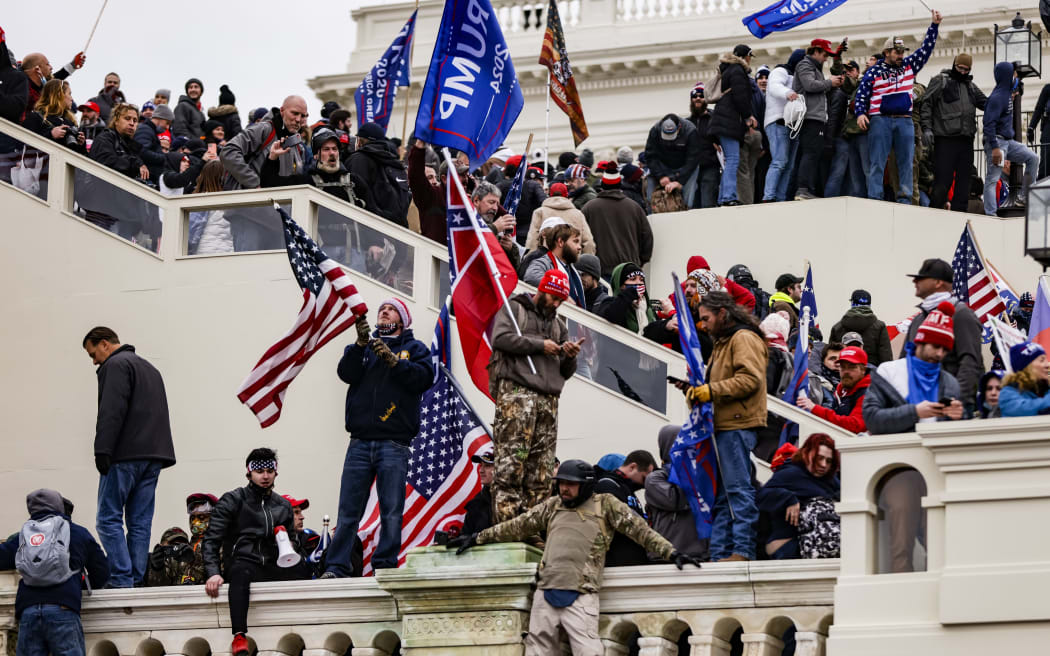
The crowds on the Capitol steps on 6 January Photo: 2021 Getty Images
Alongside the report, the committee released dozens of raw transcripts of testimony provided by witnesses in closed-door sessions. Several of Trump's biggest supporters on the far-right fringes - such as Alex Jones and white nationalist Nick Fuentes - refused to answer questions, citing their constitutional right to avoid self-incrimination.
But testimony from others - including Oath Keepers founder Stewart Rhodes and Proud Boys leader Enrique Tarrio - indicated mutual suspicion, infighting, and conspiratorial thinking among the far-right factions involved in the riot.
Rhodes was convicted of seditious conspiracy and other charges last month and potentially faces decades in prison, while Tarrio is currently on trial.
5) Trump tried to pressure Vice-President Mike Pence to illegally overturn the election results
Part of Trump's plan to remain in office revolved around a controversial reading of the US Constitution, which he believed allowed Vice-President Mike Pence, who would preside over the election certification, to declare him the victor.
On 6 January, Trump attempted to call Pence, shouting at aides to get him on the phone, the report states. The former president then falsely told Pence he had the power to intervene in the certification.
Witnesses told the committee that at one point, Trump called the vice-president a "wimp" and said he was "not tough enough".
Addressing a crowd on 6 January, Trump said he hoped Pence would "do the right thing". Later, in the midst of the attack, rioters would chant "Hang Mike Pence" as they stormed the Capitol.
6) Trump should be barred from holding public office
The panel made 11 recommendations as a result of its investigation.
One cited the constitution, which states an individual who had taken an oath to support the US Constitution but "engaged in an insurrection" or given "aid or comfort to the enemies of the Constitution" can be disqualified from office.
Trump was referred to the Department of Justice for assisting or aiding an insurrection.
-BBC
